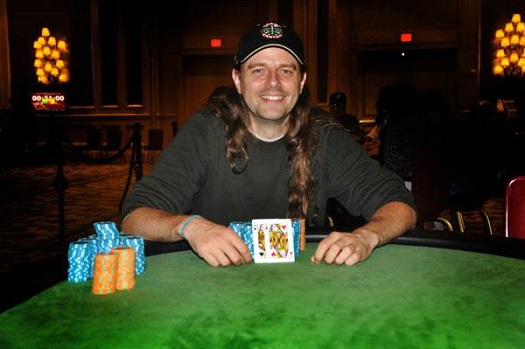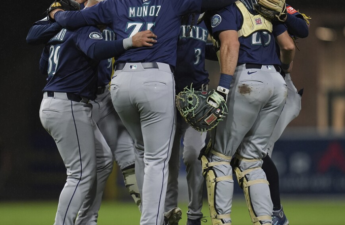
I like competing. I like games. I like situations that produce winners and losers with high regularity. I like this stuff a lot.
But why?
After I posted about my first-ever tournament win of a large poker tournament on Facebook Monday (I won Event #3 of the Gulf Coast Poker Championship, though the prize money ended in a 5-way chop for just under $5k apiece), old friend and Rutgers debater David Reiss queried about how I could reconcile a love of gambling with my political views about equality and the unimportance of wealth. It’s a good question and one that I wrestle with a lot as I try to embark on a run at playing poker more or less full-time.
My first run at a response was this:
“It’s complicated, and probably not entirely resolved like any of the myriad compromises innate to living in this society. A thumbnail sketch is probably that money is pretty much always zero-sum and thus any pay is coming out of someone’s pocket and at least poker is upfront about that fact as opposed to cloaking it. 90-95% of the people who play poker regularly, especially tournaments, can afford to lose what they’re playing with. There are definitely exceptions and I definitely feel bad about that. But I’ve made money off of student loan debt most recently, as well as donations that people intended to go directly to the poor/homeless, so I don’t think you can make money in this world as structured without it carrying some burden of guilt.
And I don’t think it’s a mystery how I feel about competitive strategics being the main basis of how well one does as far as a professional use of time.”
I could certainly write a treatise on the first and primary paragraph of that comment and probably will at some point – the challenges of being a human being in a society structured like modern America and aspiring to do good and not feel guilty all the time are things I explore with regularity internally and, when people will listen, externally. But this post is mostly going to tackle how for-granted I take the latter statement, the love of strategy and competition for their own sake and how competition seems to be its own reward.
There are plenty of semi-rabid type-A people for whom competition as its own reward seems like the obvious order of things. And while I certainly spent much of my youth being a Very Serious Person and extreme grade-skipping had a huge impact of my world-view of myself relative to others, I think I managed pretty well to avoid being a type-A bulldog. I was known during my collegiate debate career as one of the least competitive-driven and forceful people of the top tier of debaters on the circuit, the one far less likely to make novices cry in a round and even less likely to gloat over said outcome, which was seen as a near-virtuous norm for most of my rivals. I still wanted to win, I just didn’t want to make other people feel bad about me winning and I also valued things like discourse and people enjoying the round.
But for a believer in equality, I still get an awful lot of utility out of winning things. To the point that I can look at my middle twenties, between graduating college in mid-2002 and starting coaching college debate in mid-2009, as this kind of desert where I was constantly craving competitive outlets. I took my adult-league kickball team far too seriously in the Bay Area for a couple years, played online video games for vastly more time than I should have, and made a reputation for myself at poker night with friends or game night with the Garin family as the sorest winner and the trashiest talker. Just as Emily was craving the approval of grades, I was constantly seeking ways of winning things or at least riding the roller-coaster of winning and losing that competition breeds. Coaching RUDU felt like this sweet relief, partially for the intellectuality of APDA, but certainly partly just to be on the weekly run of W’s and L’s.
One outlet for this competitive angst that was a constant during that part of my life and dates back to the late 80’s is, of course, my love of baseball. And specifically the Seattle Mariners, another kind of irrational output of energy and emotion and competitive spirit for me. I have wrestled with this part of my personality a lot. Being a sports fan is kind of an objective waste of time in about twenty different ways. These teams are chosen more or less arbitrarily, have no innate value, and the presence of sports in our society puts jocks on a pedestal above those who probably objectively deserve more respect and takes massive amounts of resources away from nobler pursuits. But I absolutely adore baseball and the Mariners and I don’t know how to stop. There is real beauty in the game, there is real love in my heart for the symbols and pageantry and presence of the Mariners and all they represent, their history and their struggles and their logo, and I can’t really justify it any more than I could explain to you why I like cucumbers but not pickles. And I feel bad for it, sometimes, especially when I think about what baseballs are made out of, but I can’t help it. I truly deeply love the Mariners and baseball and will probably never stop watching, no matter how socially dubious the impact of sports is on our society.
I mean, sure. Sports are a place where diversity is celebrated, especially baseball as probably the truly most diverse sport, and ideally and eventually sports should replace wars, and there is a social outlet and recreational outlet for people and I guess sports-consciousness fights obesity in theory, though probably not in practice. I guess it’s not like holding on to some sort of love of weaponry or slaughterhouses, quite. But all of those are probably pretty flimsy justifications in the face of cities who fund huge stadiums for millionaires to cavort in but won’t build more housing for their homeless.
Now obviously being a Mariners fan since 2001 has been heartbreaking (as though 2001 itself weren’t heartbreaking enough, when the M’s set an American League record for wins and then couldn’t even make the World Series) and this leads to another aspect of competition that bears questioning. Why voluntarily put so much emotional energy into the hands of something out of one’s control? And why invest so much time into observing something that will result in upsetting you at least 40% of the time and often, with the M’s, closer to 60% of the time? Isn’t that definitively crazy? I know “fan” is short for “fanatic”, which sort of implies some instability, but why put so much of your mood in the hands of something so iffy? Is it just because everyone else is doing it?
I thought about this a bit in that mid-twenties period and really even experimented with letting go of baseball fandom and the Mariners a bit more, even while still wearing M’s jackets and hats more days than not. It didn’t take. I still wanted to watch most of their games, even in the down seasons, still followed their players like they were friends of mine. And it’s not like I was raised on this from an early age. My Dad gets a little competitive when playing Risk, but both of my parents kind of blinked at me when I told them I wanted to play Little League. They carried this “Sports?? Really?” look around for about a year or so, while still being supportive of my interest, until they’d gone to enough games to kind of fall in love with baseball along with me. I went out and found and chose this all on my own and now it’s just deeply embedded.
I don’t think this post ends with a neat little bow, some tie-in conclusion that explains it all or offers up just the right balance of reflection and thought-provocation. Truth is, I got nothing. I feel like competitive outlets are somewhere between water and food in my daily priority list, but I have no idea why. And I know that a lot of what I most loved about debate, both as a competitor and a coach, is found in poker as well, which is the strategic aspect. The constant intellectual stimulation, the dynamism of all these different personalities and perspectives vying for the same goals and taking different routes to it, and trying to outsmart everyone and get as much control of the situation as possible. This is found in good board games as well, in most of the competitive outlets I have. It’s entirely absent in baseball, of course, except vicariously. Real players and managers get to enjoy the game on that level, but the rest of us can only watch. Then again, despite my clear preference for intellectual pursuits to athletic ones, I still mostly wanted to be a major leaguer from early Little League to late high school. The competitive drive is deeply ingrained and fierce.
Obviously, if I can keep winning tournaments at poker, this monstrous competitive drive within will be sufficiently quenched that I don’t need to keep finding more things to feed it with. That said, one of my first thoughts upon winning and internalizing how much money had been at stake was that I could now seriously consider flying to Seattle if the Mariners make the playoffs this season for the first time in 13 years.
Maybe it’s all just a form of love. If I’ve learned anything in three and a half decades on Earth, it’s that love is the most irrational thing of all.


